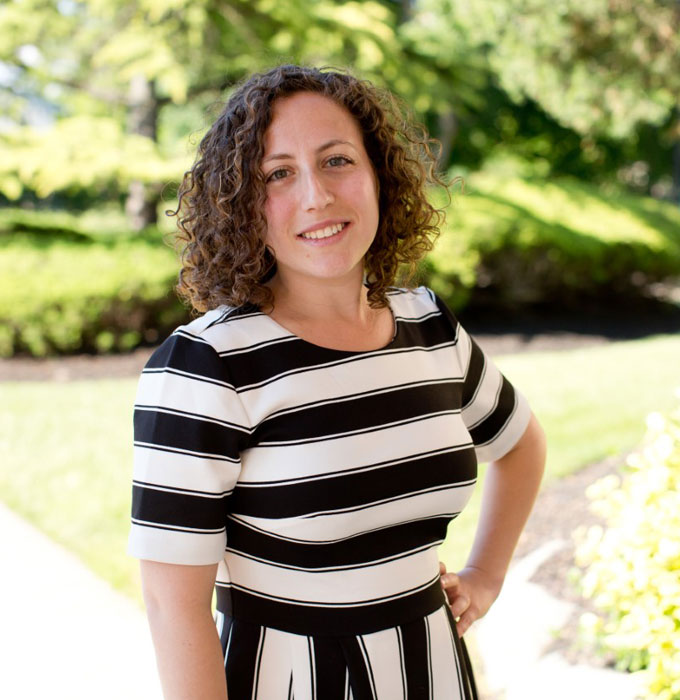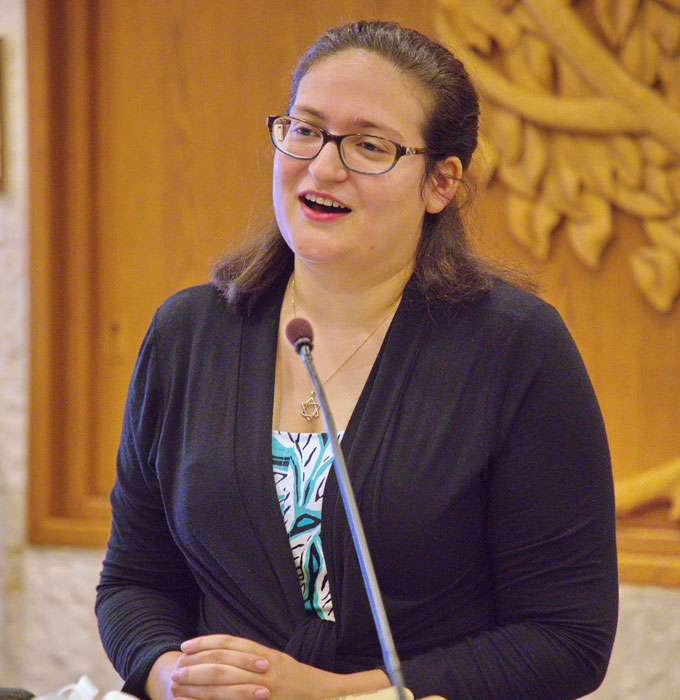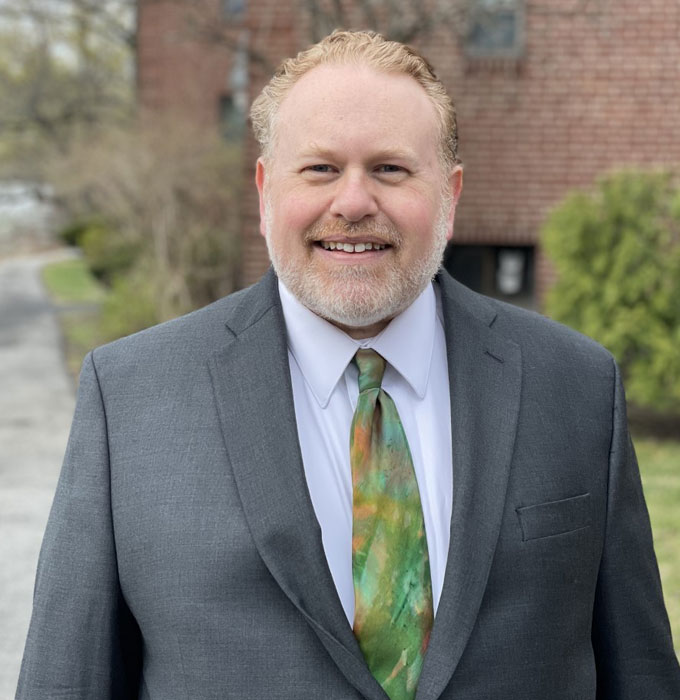Cantorial Class of 2021/5781
We are privileged and thrilled to be on the cusp of officially being called “Cantor” as we, the Hebrew College Cantorial Program Class of 2021, will be ordained on Sunday, June 6. We have been supported by the Hebrew College community, our families, friends, and colleagues. We are grateful to have had the opportunity to learn from and with amazing faculty, students and within the communities where we have interacted and worked.
In celebration of this milestone, we have created a scholarship fund to support the Hebrew College Cantorial Program. Thank you for honoring us by supporting this program which is so close to our hearts and the future of the cantorate.
Jana Schachter
Jessica Woolf Silverberg
Marc Stober

Jana Schachter
ְנָתַ֣תִּי אֶת־לִבִּ֗י לִדְר֤וֹשׁ וְלָתוּר֙ בַּֽחָכְמָ֔ה עַ֛ל כָּל־אֲשֶׁ֥ר נַעֲשָׂ֖ה תַּ֣חַת הַשָּׁמָ֑יִם
“I gave my mind to seek and to probe with wisdom all that happens under the heavens.”
– Kohelet 1:3
In the first half of this verse from Kohelet, King Solomon reflects on the journey of his life. In the desire for wisdom, Solomon dedicated his entire being to the pursuit of intellectual growth by observing the surrounding world. In many ways, it reminded me of my own journey to Hebrew College. From the time I was young, I demonstrated a serious passion to learn about Judaism. It was ultimately this love of learning and the desire for wisdom that brought me to cantorial school.
Yet, like Kohelet, during my time at Hebrew College, I have also learned how the pursuit of wisdom can sometimes feel futile. As the second half of the verse states, ”[Wisdom is] An unhappy business that G-d gave humanity to be concerned with.” The more I learn, the more I realize how much I don’t know. Wisdom is not a means to an end, rather it is a constant process of growth. As a member of the cantorate, I wish to share my love of learning, prayer, and the pursuit of wisdom with the Jewish community.
I am grateful to all the people whose help brought me to this day. Thank you to all my teachers, mentors, and the faculty at Hebrew College for sharing their wisdom with me. To my classmates who accompanied me on this journey, I will never forget the blood, sweat, and tears we shared. Thank you to my shul in New Jersey for nurturing my love of Judaism and for showing me the power of small Jewish communities. I am grateful to my parents, sister, Grandma Sandie, and extended family for all their love and support. To all my relatives who are no longer here, I am indebted to their sacrifices and struggles; especially my grandfather, Al Schachter z”l, who was with me physically at the beginning of my journey, and continues to be with me in spirit. I feel your presence.

Jessica Woolf Silverberg
וְעָ֥שׂוּ לִ֖י מִקְדָּ֑שׁ וְשָׁכַנְתִּ֖י בְּתוֹכָֽם׃
And let them make for Me a sanctuary that I may dwell among them. (Exodus 25:8)
When I applied to Hebrew College four years ago, I was asked to reflect on what I believed to be the role of the cantor. I had just started watching The West Wing and found my inspiration in the first season episode “Take This Sabbath Day,” which is centered on White House Communications Director Toby Ziegler, who is Jewish. In this episode, the lawyer of a man about to be executed contacts Toby’s rabbi, Rabbi Glassman, in a last ditch effort to influence Toby (and through him, the President). Rabbi Glassman gives a sermon that Shabbat about capital punishment. After being called away from services early, Toby returns to see his rabbi the next day. While the two men discuss what the Torah says on capital punishment the cantor is heard in the background rehearsing (what I now know is) Max Helfman’s setting of Hashkiveinu. Toby continues:
As Communications Director, uh, I’m a counselor to the President to be sure. But my role in these situations is generally…I create a public face for what… I don’t influence policy. […] You know what I think? I think you knew I was coming back here. And I think you put her there on purpose [gestures to Cantor]
Rabbi Glassman: She’s our communications director.
Rabbi Glassman’s words still ring true for me after all this time. Like Toby, I am just the messenger. But now, I am more than a shlichat tzibbur; today I become k’lei kodesh, a holy vessel that will hold and carry the prayers of my community.
In the opening of Parashat Terumah, God instructs Moses to tell the Israelites to build a mikdash, a temple, for God’s Shekhina to dwell. The Medieval French scholar Rashi comments on this verse,“they shall make for My Name a house of holiness” ועשו לשמי בית קדושה. But in the second verse, this holy space is described as a mishkan, not a mikdash. Rashi continues by saying that these verses must be paired. So, what is the difference between a mikdash and a mishkan? The Gemara teaches in Eruvin 2a that these terms are interchangeable for the purpose of making ritual offerings:
אַשְׁכְּחַן מִשְׁכָּן דְּאִיקְּרִי מִקְדָּשׁ, וּמִקְדָּשׁ דְּאִיקְּרִי מִשְׁכָּן
We find that the Tabernacle is called Temple, and that the Temple is called Tabernacle; therefore, the halakhot that govern one can be derived from the other.
But then the Gemara continues on 2b:
הָהוּא בְּאָרוֹן כְּתִיב. אֶלָּא מֵהָכָא: ״וְעָשׂוּ לִי מִקְדָּשׁ וְשָׁכַנְתִּי בְּתוֹכָם״
That instance of the term Temple is not written with regard to the Tabernacle; rather, it is written with regard to the ark and the other sacred objects in the Tabernacle, as the sons of Kehat carried only the sacred vessels and not the Tabernacle itself. Rather, it is derived from here: “And let them make Me a Temple that I may dwell among them” (Exodus 25:8), where the reference is to the Tabernacle.
According to this discussion, the mikdash in this pasuk is not the Beit HaMikdash in Jerusalem, it is the aron kodesh and other sacred objects that the Israelites carried with them in the wilderness. From this we learn that, although the terms mishkan and mikdash can be used interchangeably, the mishkan has no permanent location and was meant to be temporary until we reached Eretz Yisrael. The words mishkan and Shekhina come from the same root, שָׁכַן, meaning “to dwell”. Therefore, the existence of the mishkan enables God to dwell among the Israelites wherever they are. The word mikdash shares a root with kedusha, קָדַשׁ, meaning “holy” or “sanctified”. The Beit HaMikdash is a stable and permanent structure with precise measurements and components that are described in great detail in the rest of Parashat Terumah, while the mishkan is repeatedly being set up and taken down and its holiness comes from the aron kodesh, not from the ground.
With the move to virtual services during this pandemic, we have all been reminded that the synagogue is just a building. Just as the mishkan enabled God to dwell among the Israelites wherever they were, Zoom has enabled us to connect to Judaism from any electronic device at any time (for better or worse). In the words of Scruggs and Thompson, with my ordination I ask God to prepare me to be a sanctuary. A living, moving, and breathing sanctuary that the Shekhina will choose to dwell in so I can serve as one of the many communications directors for the house of God.
I am honored to do this holy work and I am blessed with all of the love and support I’ve received along the way. I’d like to thank all of my cantorial classmates for sticking with me on this never ending journey. I’d also like to thank all of my students for teaching me how to be a good Jewish educator, particularly at the Alvin Browdy Religious School at Ohr Kodesh Congregation and Beit Rabban at Temple Beth Zion. You will always be “my” kids.
I’d like to thank Rabbi Allison Poirier `19 and the community at Temple Beth Sholom in Framingham for welcoming me into their community over the last two years.
I am eternally grateful for all of my teachers but I especially want to thank Dr. Joshua R. Jacobson. As my teacher, you pushed my abilities further than I thought possible and turned me into a master storyteller through the art of cantillation. As my choir director, you provided me with countless opportunities that showed me how to receive and share Torah through music. I’d also like to thank my voice teacher Frank Kelley for helping me find my true voice.
I owe much of my success to all of the incredible hazzanim who have mentored me along the way but especially:
Hazzan Matthew Austerklein, for sending me off to school with a priceless treasure trove of cantorial music and being my rock during an unprecedented job search process.
Rav Hazzan Dr. Scott Sokol, for being my first cantorial coach and introducing me to the Temple Beth Sholom community.
Hazzenet Hinda Eisen Labovitz `14, for…everything. You had faith that I would become a great cantor before I did and I can’t even begin to express my gratitude.
Finally, I wouldn’t have made it to this day without my parents’ investment in my music education that provided the foundation for all of my learning at Hebrew College. I also owe a great deal to my in-laws for their unconditional support over the last four years.
Lastly to my partner in crime and all things, Steven: I couldn’t have done any of this without you. From our third date when you came over and cooked dinner so I could finish my application essays; to leading Mincha as the “opening act” at my High Holiday pulpits; to giving me the only real home office space when we both were forced to work from home during the pandemic, you are an ultimate mentsch. You wear the badge of rebbetz-man proudly and will always be the brightest star in my universe.

Marc Stober
.וַיִּבְרָא אֱלֹהִים אֶת־הָֽאָדָם בְּצַלְמוֹ בְּצֶלֶם אֱלֹהִים בָּרָא אֹתוֹ
God created the human in their image; in God’s image, God created them. (Genesis 1:27)
.לְאֵל בָּרוּךְ נְעִימוֹת יִתֵּנוּ
To blessed God, they sweetly sing. (Morning Liturgy)
I didn’t expect to become a cantor. I simply wanted to make a difference in the world. I wanted to make the world a better place—what we call tikkun olam, “repair the world,” a term that is about spiritual work as much as temporal justice. What greater purpose is there? And I had a lot of faith in Jewish tradition to guide that work.
Standing in front of the room doesn’t come naturally to me. For a large part of my adult life, I avoided it. As I kept seeking my path, I eventually realized I was going to need to challenge myself to take on more visible leadership roles, including as a teacher and as a singer. Going back school has been a significant transformative experience, more than I ever expected. A lot looks different than it did a few years ago, and I’ve learned as much about myself as I have about the liturgy.
There are two big lessons I’ve learned while at Hebrew College. One is the meaning of “blessing.” As a cantor, my work is reciting blessings. What does that even mean? To bless means to empower, to recognize the strength inside someone or something. We bless God to recognize a power that in the universe that is beyond us as individuals. More importantly, we ask for God’s blessings for us, and so bless each other, affirming that each one of us is good and special and powerful. That’s what it means to be made b’tzelem Elohim, in God’s image.
The other lesson is that by studying texts, we are learning to listen. That’s why learning is at the heart of Jewish practice. Here’s a secret: being a spiritual leader isn’t about talking, it’s about listening. To the texts, to your innermost voice, and, most importantly, to the people you encounter. Judaism believes that each person matters, and we get to elevate their voices. For those of us who serve as cantors, literally so, in meaningful song, as means to improving the world.
I feel privileged for being able to complete this program of study. I am also grateful for the caring of many teachers, friends, and family over the past few years. Finally, I want to acknowledge my children, Hannah and Max, who as young adults have already embarked on their own paths of tikkun olam work. They are an inspiration who give me boundless hope for the future.

